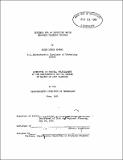Criteria for an effective water resource planning process
Author(s)
Bowers, James Myron
DownloadFull printable version (12.90Mb)
Other Contributors
Massachusetts Institute of Technology. Dept. of City and Regional Planning.
Advisor
Roland B. Greeley.
Terms of use
Metadata
Show full item recordAbstract
In examining the present status of water resource planning in the Pacific Northwest, numerous critical inadequacies become readily apparent. One method of minimizing some of these inadequacies is through administrative reorganization. Realizing this there have been many different reorganization proposals put forth. Along with these proposals has come much propaganda. In order to obtain a clearer picture comparative criteria were established. Upon doing this it was decided to limit the analysis to the compact, the authority and the inter-agency approaches. Upon applying the criteria to these three structures, the following conclusions were reached: 1) the compact would probably be worse than the existing setup, 2) the inter-agency committee has some value and not too many dangers, 3) the authority fulfills by far the most criteria but because of certain possible dangers should not be strived for, 4) that the criteria are useful in discovering which structures may be unacceptable but they do not tell which is the optimum one. Much is dependent upon the type of planners the structures attract.
Description
Thesis (M.C.P.)--Massachusetts Institute of Technology, Dept. of City and Regional Planning, 1961. Includes bibliographical references (leaves 171-178).
Date issued
1961Department
Massachusetts Institute of Technology. Department of City and Regional Planning; Massachusetts Institute of Technology. Department of Urban Studies and PlanningPublisher
Massachusetts Institute of Technology
Keywords
City and Regional Planning.